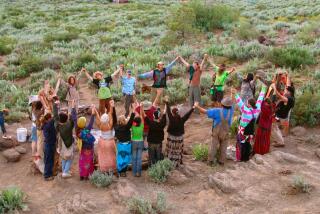Activists Hang From Trees in ‘Pods’ to Block Logging Efforts
ESTACADA, Ore. — With a yell of “Hey, Pod!” and a ruffling of tarps, a set of legs suddenly swung out from high in the air.
Brian Schulz was in his 12th hour in a “pod” made of a cargo net lashed together with cords hanging about 70 feet above a U.S. Forest Service road--and he wasn’t expecting to come down any time soon.
He’s one of dozens of protesters trying to get logging called off in the Eagle Creek watershed of Mt. Hood National Forest by being thorns in the agency’s side--blocking roads, living in trees and camping in the area.
“It’s safe enough to sit in, but just barely,” Schulz said of his pod home, which is connected, with six cords, to a locked Forest Service gate. “The Forest Service can’t come in here and safely remove this structure. If they sever any of the lines, they put me in a potentially life-threatening situation.”
The activists--members of the Cascadia Forest Alliance--argue that logging in the Eagle Creek area threatens a drainage basin that provides water to almost 200,000 people in the Portland area. They say the logging could harm rare plants and animals and will destroy centuries-old trees.
The Forest Service says the harvest meets all requirements of the Northwest Forest Plan and will not threaten water quality. Officials also say that because most of the trees are Douglas firs that grew after a fire about 130 years ago, logging will result in more diversity and promote a healthy, sustainable forest.
Logging was scheduled to begin for this year in the 1,030-acre area Thursday. But it didn’t. And it may not for a while.
Vanport Manufacturing of Boring, Ore., which owns the logging contract, needs the Forest Service to make the road accessible. But the agency, which says the pods are illegal structures, is taking a wait-and-see approach.
“We don’t have a time frame,” said Glen Sachet, spokesman for the Mt. Hood National Forest. “We’re just assessing the situation--looking at it from a safety standpoint, ranging from the illegal protesters to our employees.”
But the Forest Service says the activists are going about their protest in the wrong way.
“We would hope these folks would come out of the trees on their own and use their resourcefulness and energy toward a more positive, legal, democratic process,” said Sachet, the spokesman.
The Northwest Forest Plan reduced logging in national forests by 80% to protect old-growth habitat for fish and wildlife. But the Eagle Creek cutting was among operations exempted by Congress from environmental laws to facilitate logging at the height of the timber battles of the 1990s.
More to Read
Sign up for Essential California
The most important California stories and recommendations in your inbox every morning.
You may occasionally receive promotional content from the Los Angeles Times.










